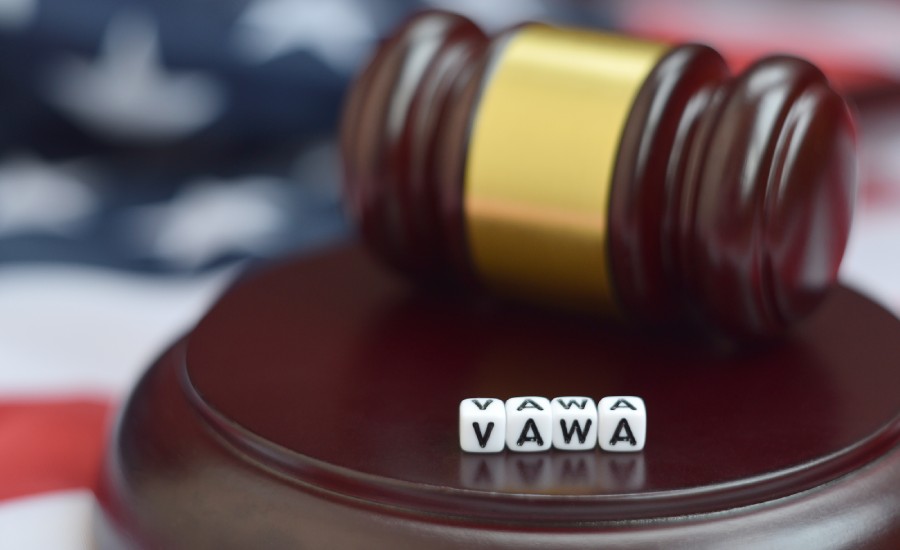

If you are a victim of abuse at the hands of a family member who is a U.S. citizen or a lawful permanent resident, or if you know victims in similar circumstances, this blog is for you.
We will explain how you can adjust your status through the Violence Against Women Act (VAWA) and what VAWA processing time you can expect.
At Spar & Bernstein, our experienced attorneys will handle your case with care and compassion, and do everything in our power to help you stay protected and remain in the U.S.
What Is VAWA?
The Violence Against Women Act (VAWA) is a U.S. federal law that allows victims of abuse who are related to U.S. citizens and lawful permanent residents file for an adjustment of status through self-petitioning, without the need to rely on their abuser. The Violence Against Women Act (VAWA) is a U.S. federal law that allows victims of abuse who are related to U.S. citizens and lawful permanent residents file for an adjustment of status through self-petitioning, without the need to rely on their abuser.
Passed by Congress in 1994 and reauthorized in 2000, 2005, 2013 and 2022, VAWA:
- Serves as a path to lawful immigration status for victims of abuse who otherwise must rely on their abusers to file for status for them
- Raises awareness of various forms of violence, including domestic and dating violence, stalking and sexual assault
The process of remaining lawfully in the U.S. through VAWA includes two steps:
- Filing a VAWA petition simultaneously with your application to adjust your status
- Applying for a Green Card after your VAWA petition is approved
Although the law contains the word “women” in its abbreviation, it refers to people of any gender, provided they can qualify as a VAWA self-petitioner.
Benefits Of VAWA
Without VAWA, victims of domestic violence would be forced to depend on their abuser to file for immigration sponsorship with the United States Citizenship and Immigration Service (USCIS), making it difficult or impossible to escape abusive situations without risking their legal residency in the U.S.
With VAWA, you do not need a relative to file a petition to classify you as their alien relative so you can adjust your status to lawful permanent resident and obtain a Green Card. Instead, you can submit a self-petition and are described as a VAWA self-petitioner.
If you are approved for VAWA, you:
- Receive protection from deportation
- Obtain the right to work legally in the U.S.
- Can apply for a Green Card
- Are allowed to include certain family members in your VAWA petition
Who Is Eligible For A VAWA Self-Petition?
You can file a VAWA self-petition if you are a victim of violence at the hands of:
- A spouse or former spouse who is a U.S. citizen or a lawful permanent resident
- A parent who is a U.S. citizen or a lawful permanent resident
- A child who is a U.S. citizen
To file a VAWA petition, you must meet the following eligibility requirements:
- You have a qualifying relationship with your abusive relative as per the list above
- You were a victim of battery or cruelty from your relative
- You live or have lived with your abusive relative
- You are a person of good moral character
There is no fee associated with filing a VAWA petition.

What Documents Do You Need To Support Your VAWA Petition?
To file for an adjustment of status based on VAWA, you must submit:
- Your self-petition using Form I-360, Petition for Amerasian, Widow(er), or Special Immigrant
- Proof that you are a spouse, child, or parent of the abuser, such as marriage or divorce certificates, birth certificates or shared accounts
- Evidence that the abuser is a U.S. citizen or a lawful permanent resident, such as a copy of the abuser’s U.S. passport, certificate of naturalization, immigration document showing their immigration status or birth certificate
- Evidence that you lived with the abuser, such as lease agreements or utility bills listing both of your names, or tax returns
- Evidence that you are a person of good moral character, such as police clearance records or declarations from family members and friends
- Evidence that you suffered abuse.
- A copy of your passport
- A copy of your birth certificate
- Proof that you currently live in the U.S.
There may be instances where you lack certain documents to support your case, such as proof of your family member’s citizenship or evidence of physical or emotional abuse. In these situations, the experienced lawyers at Spar & Bernstein can help you build a strong case, providing you with the support and reassurance you need.
In other situations, such as when you are an immediate relative of a U.S. citizen, you may be able to file Form I-485, Application to Register Permanent Residence or Adjust Status (Green Card), and Form I-765, Application for Employment Authorization, at the same time. This concurrent filing can simplify the process, providing you with a sense of relief and making the immigration journey less overwhelming.
Immediate relatives include spouse, child, or parent of a U.S. citizen — they qualify for adjustment of status immediately without having to wait for visa availability.
At Spar & Bernstein, our knowledgeable attorneys will help you prepare and file your VAWA petition, along with the additional documents needed, and follow up on your petition on your behalf.
What Documents Can Prove Abuse When Filing Your VAWA Petition?
Being a victim of battery or abuse by a loved one can affect your physical, mental, and emotional well-being. The situation can be even more overwhelming when you are in a foreign country, relying on your abuser.
To prove you have been a victim of abuse from a relative who is a U.S. citizen or lawful permanent resident, you can submit a variety of reports, documents, photos and statements, such as:
- Your own detailed and credible statements provided in an affidavit
- Transcripts of your emergency calls to 911
- Police reports based on your calls about violence against you or your property
- Arrest records of your abuser, following your calls about violence
- Police statements from police officers who have visited you after signs of domestic abuse
- Hospital records serving as evidence that you were treated for injuries, even if you did not mention your injuries resulted from abuse at the time
- Shelter records from shelters meant for victims of domestic violence or battery
- Psychiatric or therapeutic records showing you suffered mental or emotional distress related to the abuse you had suffered
- Phone records showing you were harassed through frequent phone calls or texts
- Emails with threatening or controlling messages
- Photos of the injuries you have suffered because of the abuse
- School records, if a child shared information about the abuse with a teacher, principal or other staff members
- Declarations from neighbors, coworkers, or friends who have witnessed the abusive behavior against you

What Is The Typical VAWA Processing Time?
Once USCIS receives your self-petition, they will assess your statements and supporting documents and determine if your petition is approvable.
If your petition is approved, USCIS will send you a Prima Facie Approval letter that will allow you to receive public benefits as a victim of violence, serving to support you until USCIS makes a final decision on your petition.
Form I-360 VAWA processing time varies depending on different factors, but typically takes 40.5 months. This processing time is calculated based on the duration it took to complete 80% of adjudicated cases over the last six months.
As of January 29, 2023, Form I-360 is processed only at the Humanitarian, Adjustment, Removing Conditions, and Travel Documents (HART) Service Center.
To check the status of your petition, visit the USCIS website.
For more information on when you can expect your Prima Facie Approval letter, watch the episode below of Brad Show Live, where our Managing Partner, Brad Bernstein, gives more details to victims of abuse.
Possible Outcomes After Filing A VAWA Self-Petition
Your VAWA self-petition can lead to several different outcomes. Here’s what to expect for each:
Your VAWA Petition Is Approved
If your VAWA petition is approved, you can:
- File Form I-485 for a Green Card
- Apply for work authorization using Form I-765 while waiting for your Green Card application to be processed
Your Petition Is Not Granted
If your petition is not granted, you may appeal the decision or submit your VAWA application again.
Your petition may be denied due to a number of factors, such as:
- Failure to provide evidence of your relationship with the abuser
- Failure to provide evidence of your abuser’s status as a U.S. citizen or lawful permanent resident
- Failure to provide evidence that you have been a victim of cruelty or abuse
- Failure to provide evidence that you have lived with the abuser
- Failure to provide evidence of your good moral character
If your petition is denied, contact our knowledgeable immigration attorneys at Spar & Bernstein — they will help you resubmit your VAWA petition or research other options to adjust your status in the U.S.
Eligibility For A Green Card If Your VAWA Petition Was Approved
To be eligible for VAWA-based Green Card, you must:
- Be physically present in the U.S. at the time you submit Form I-485, Application to Register Permanent Residence or Adjust Status
- Have an immigrant visa immediately available both when you file Form I-485 and when USCIS decides on your application
- Be eligible to receive an immigrant visa
- Have no adjustment of status bars applying to you
- Be admissible to the U.S. for lawful permanent residence or eligible for a waiver of inadmissibility
Check how long it takes to obtain a Green Card through VAWA in the Brad Show Live episode below.
How Spar & Bernstein Can Help You With Your VAWA Petition
With 60 years of experience in all areas of immigration law, The Law Offices of Spar & Bernstein has a team of knowledgeable attorneys who have helped thousands of people seeking U.S. asylum and refugee protection, citizenship and naturalization, family immigration and employment immigration.
With the utmost patience and care in times of uncertainty, fear and despair for our clients, we have helped victims of violence under VAWA:
- File a VAWA petition along with the required additional documents
- Pursue applicable benefits for victims of abuse
- Track the progress of their petition
- File an application for travel while waiting on a VAWA petition outcome
- File for a VAWA-based Green Card
- File for employment authorization
Watch more on VAWA from Brad Show Live.
FAQs About VAWA And VAWA Processing Time
The following FAQs provide additional insights into VAWA and its processing times, helping you better understand what to expect when filing a VAWA petition.
Why do VAWA processing times vary?
VAWA processing times can vary due to multiple factors such as the number of petitions received, the workload at the service center, and any additional information or evidence requested by USCIS.
What happens if my VAWA petition takes longer than expected?
If your VAWA petition takes longer than the posted processing time, you can submit an inquiry to USCIS or seek assistance from an immigration attorney.
How can I avoid delays in my VAWA petition processing?
To avoid delays in VAWA petition processing, make sure to include all required documents and respond promptly to any requests for additional information from USCIS.
Will my abuser know if I file a VAWA petition?
No, your abuser will not know that you filed a VAWA petition, as USCIS keeps the process confidential to safeguard you.
Can I receive public benefits if my VAWA petition is approved?
If your VAWA petition is approved, you may be eligible for certain public benefits, such as work authorization and access to social services. You may also get a prima-facie determination that will allow you to collect benefits while your application is pending.


